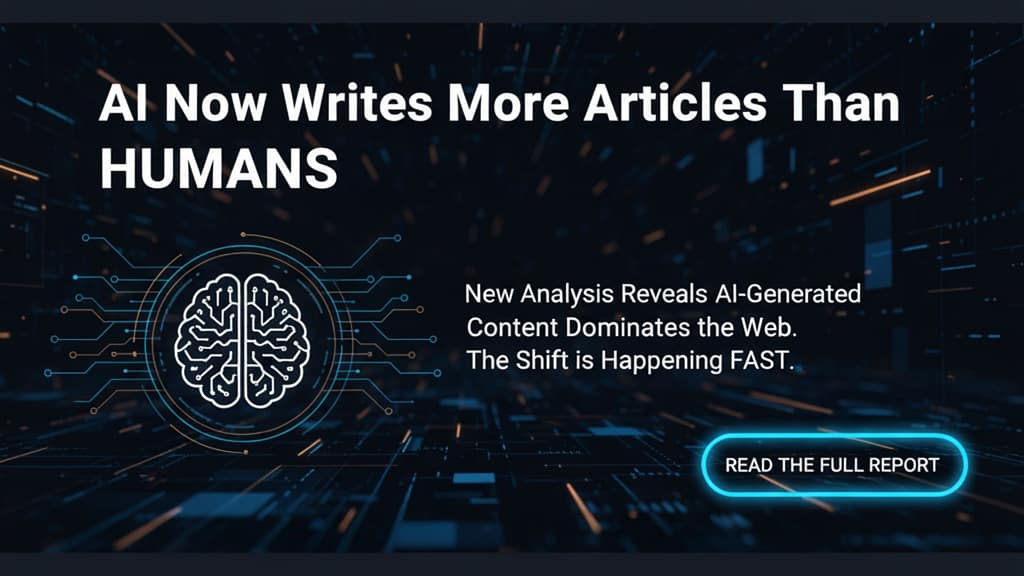Hey Looters! Ever scrolled through an article and thought, “Hmm, this sounds a bit… robotic?” Well, you might be onto something. We’ve got some mind-boggling news for you today that changes everything we thought we knew about the internet. A groundbreaking new analysis has confirmed a major milestone: for the first time in history, AI now writes more articles than humans. Yes, you read that right. The machines are officially out-typing us, and this digital revolution is happening faster than anyone expected.
This isn’t just a random guess; it’s backed by some serious data. Let’s dive into how researchers uncovered this and what it means for all of us who spend our days browsing the web.
The Shocking Study: How We Know AI Now Writes More Articles Than Humans
So, how did we get this bombshell of a statistic? Researchers embarked on a massive project to understand the digital content landscape. They took a huge sample of over 65,000 web articles published between 2020 and 2025 from the CommonCrawl dataset, which is like a giant library of the internet.
To separate the human from the machine, they used a sophisticated tool called the Surfer AI Detector. The rule was simple: if the detector flagged more than half of an article’s text as AI-generated, it was officially counted as a machine-made piece. To make sure their findings were accurate, they were extra careful. For instance, they cross-checked articles by their publication dates. Any articles published before the rise of tools like ChatGPT were automatically assumed to be human-written to avoid any false alarms. This meticulous approach gives us a clear picture of this new reality where AI now writes more articles than humans.
The Tipping Point: When Did the AI Takeover Happen?
The study pinpointed the exact moment the scales tipped. It all happened in November 2024. That was the first month where AI-generated content officially surpassed human output. There was a small dip shortly after, probably as search engines adjusted their algorithms, but the trend quickly bounced back. Today, AI content isn’t just leading; it’s dominating, and the gap is growing every single day.
This rapid change is fueled by the easy availability of powerful AI writing tools. For content marketers, bloggers, and businesses, it’s a game-changer, allowing them to produce vast amounts of content at an incredible speed. The demand for constant online updates has created the perfect environment for this AI boom.
Also Read: Bigbasket Loot : Items at ₹10! Unbelievable Grocery Deal
Is It All Robot Gibberish? Not Exactly.
Now, when you hear “AI-written,” you might imagine soulless, nonsensical articles. But the reality is a bit more complex. The report notes that many of these so-called AI articles aren’t 100% automated. A lot of them show clear signs of human intervention. This is what we call the “AI-assisted” model.
Here’s how it usually works:
- A human provides a prompt or an outline to the AI.
- The AI generates a first draft.
- A human editor then steps in to fact-check, refine the tone, add personal insights, and ensure it reads naturally.
This hybrid approach combines the speed of AI with the nuance and creativity of a human mind. However, the study also found that this type of content, even with human editing, still appears less frequently in the top search results on Google. For now, it seems that high-quality, human-centric content still has the edge when it comes to ranking.
What This Means for You, a Digital Citizen
This shift isn’t just a tech headline; it has real-world implications for everyone who uses the internet.
Can You Trust What You Read?
With so much AI content out there, it’s more important than ever to be a critical reader. While AI can be a great tool, it can also be used to spread misinformation or create low-quality, spammy articles. Learn to spot the signs of AI writing: overly generic language, repetitive sentence structures, and a lack of personal stories or genuine emotion.
The Future of Google Search
Google’s main challenge is to sift through this mountain of new content and show you the most helpful and reliable information. Their official stance is that they reward high-quality content, regardless of whether it was written by a human or an AI. This means their algorithms are getting smarter at detecting “Helpful Content.” The fact that AI now writes more articles than humans is pushing search engines to evolve faster than ever before.
Final Thoughts: The New Digital Age
The revelation that AI now writes more articles than humans marks the beginning of a new era for the internet. It’s a testament to how far technology has come. While it brings challenges, it also opens up new possibilities for content creation. The key takeaway is that the human touch—creativity, critical thinking, and genuine expertise—is more valuable than ever. The best content of the future will likely be a collaboration between human intelligence and artificial intelligence. What are your thoughts on this AI takeover? Are you excited or worried? Let us know in the comments below!

Pingback: BOB e Pay UPI Offer: Get ₹50 Free Cashback Instantly! - Bindassloot
Pingback: Free Microsoft 365 Personal: Get 1 Year Subscription! - Bindassloot